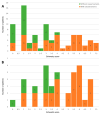The Yield of Genetic Testing and Putative Genetic Factors of Disease Heterogeneity in Long QT Syndrome Patients
- PMID: 39596046
- PMCID: PMC11593843
- DOI: 10.3390/ijms252211976
The Yield of Genetic Testing and Putative Genetic Factors of Disease Heterogeneity in Long QT Syndrome Patients
Abstract
Genetic overdiagnosis of long QT syndrome (LQTS) becomes a critical concern due to the high clinical significance of DNA diagnosis. Current guidelines for LQTS genetic testing recommend a limited scope and strict referral based on the Schwartz score. Nevertheless, LQTS may be underdiagnosed in patients with borderline phenotypes. We aimed to evaluate the total yield of rare variants in cardiac genes in LQTS patients. The cohort of 82 patients with LQTS referral diagnosis underwent phenotyping, Schwartz score counting, and exome sequencing. We assessed known LQTS genes for diagnostics, as per guidelines, and a broader set of genes for research. Diagnostic testing yield reached 75% in index patients; all causal variants were found in KCNQ1, KCNH2, and SCN5A genes. Research testing of 248 heart-related genes achieved a 50% yield of molecular diagnosis in patients with a low Schwartz score (<3.5). In patients with LQTS-causing variants, each additional rare variant in heart-related genes added 0.94 points to the Schwartz score (p value = 0.04), reflecting the more severe disease in such patients than in those with causal variants but without additional findings. We conclude that the current LQTS genetic diagnosis framework is highly specific but may lack sensitivity for patients with a Schwartz score <3.5. Improving referral criteria for these patients could enhance DNA diagnosis. Also, our results suggest that additional variants in cardiac genes may affect the severity of the disease in the carriers of LQTS-causing variants, which may aid in identifying new modifier genes.
Keywords: Schwartz score; clinical heterogeneity; genetic diagnosis; genetic modifiers; genetic testing; long QT syndrome; whole exome sequencing.
Conflict of interest statement
The authors declare no conflicts of interest.
Figures





Similar articles
-
Depressing time: Waiting, melancholia, and the psychoanalytic practice of care.In: Kirtsoglou E, Simpson B, editors. The Time of Anthropology: Studies of Contemporary Chronopolitics. Abingdon: Routledge; 2020. Chapter 5. In: Kirtsoglou E, Simpson B, editors. The Time of Anthropology: Studies of Contemporary Chronopolitics. Abingdon: Routledge; 2020. Chapter 5. PMID: 36137063 Free Books & Documents. Review.
-
Falls prevention interventions for community-dwelling older adults: systematic review and meta-analysis of benefits, harms, and patient values and preferences.Syst Rev. 2024 Nov 26;13(1):289. doi: 10.1186/s13643-024-02681-3. Syst Rev. 2024. PMID: 39593159 Free PMC article.
-
Genedrive kit for detecting single nucleotide polymorphism m.1555A>G in neonates and their mothers: a systematic review and cost-effectiveness analysis.Health Technol Assess. 2024 Oct;28(75):1-75. doi: 10.3310/TGAC4201. Health Technol Assess. 2024. PMID: 39487741 Free PMC article.
-
Infliximab for maintenance of medically-induced remission in Crohn's disease.Cochrane Database Syst Rev. 2024 Feb 19;2(2):CD012609. doi: 10.1002/14651858.CD012609.pub2. Cochrane Database Syst Rev. 2024. PMID: 38372447 Free PMC article. Review.
-
Qualitative evidence synthesis informing our understanding of people's perceptions and experiences of targeted digital communication.Cochrane Database Syst Rev. 2019 Oct 23;10(10):ED000141. doi: 10.1002/14651858.ED000141. Cochrane Database Syst Rev. 2019. PMID: 31643081 Free PMC article.
References
-
- Wilde A.A.M., Semsarian C., Márquez M.F., Shamloo A.S., Ackerman M.J., Ashley E.A., Sternick E.B., Barajas-Martinez H., Behr E.R., Bezzina C.R., et al. European Heart Rhythm Association (EHRA)/Heart Rhythm Society (HRS)/Asia Pacific Heart Rhythm Society (APHRS)/Latin American Heart Rhythm Society (LAHRS) Expert Consensus Statement on the State of Genetic Testing for Cardiac Diseases. Europace. 2022;24:1307–1367. doi: 10.1093/europace/euac030. - DOI - PMC - PubMed
MeSH terms
Substances
Grants and funding
LinkOut - more resources
Full Text Sources
Medical
Miscellaneous

